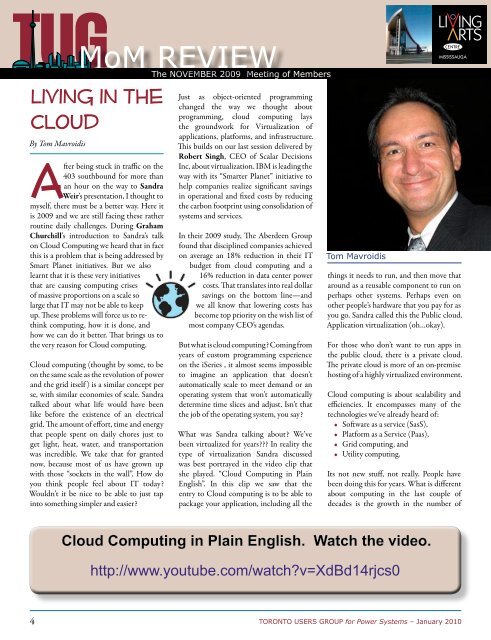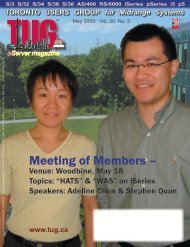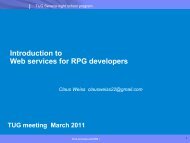Complete Magazine - PDF (5589K) - Toronto Users Group for Power ...
Complete Magazine - PDF (5589K) - Toronto Users Group for Power ...
Complete Magazine - PDF (5589K) - Toronto Users Group for Power ...
You also want an ePaper? Increase the reach of your titles
YUMPU automatically turns print PDFs into web optimized ePapers that Google loves.
Living in the<br />
Cloud<br />
By Tom Mavroidis<br />
After being stuck in traffic on the<br />
403 southbound <strong>for</strong> more than<br />
an hour on the way to Sandra<br />
Weir’s presentation, I thought to<br />
myself, there must be a better way. Here it<br />
is 2009 and we are still facing these rather<br />
routine daily challenges. During Graham<br />
Churchill’s introduction to Sandra’s talk<br />
on Cloud Computing we heard that in fact<br />
this is a problem that is being addressed by<br />
Smart Planet initiatives. But we also<br />
learnt that it is these very initiatives<br />
that are causing computing crises<br />
of massive proportions on a scale so<br />
large that IT may not be able to keep<br />
up. These problems will <strong>for</strong>ce us to rethink<br />
computing, how it is done, and<br />
how we can do it better. That brings us to<br />
the very reason <strong>for</strong> Cloud computing.<br />
Cloud computing (thought by some, to be<br />
on the same scale as the revolution of power<br />
and the grid itself ) is a similar concept per<br />
se, with similar economies of scale. Sandra<br />
talked about what life would have been<br />
like be<strong>for</strong>e the existence of an electrical<br />
grid. The amount of ef<strong>for</strong>t, time and energy<br />
that people spent on daily chores just to<br />
get light, heat, water, and transportation<br />
was incredible. We take that <strong>for</strong> granted<br />
now, because most of us have grown up<br />
with those “sockets in the wall”. How do<br />
you think people feel about IT today?<br />
Wouldn’t it be nice to be able to just tap<br />
into something simpler and easier?<br />
4<br />
MoM REVIEW<br />
The NOVEMBER 2009 Meeting of Members<br />
Just as object-oriented programming<br />
changed the way we thought about<br />
programming, cloud computing lays<br />
the groundwork <strong>for</strong> Virtualization of<br />
applications, plat<strong>for</strong>ms, and infrastructure.<br />
This builds on our last session delivered by<br />
Robert Singh, CEO of Scalar Decisions<br />
Inc, about virtualization. IBM is leading the<br />
way with its “Smarter Planet” initiative to<br />
help companies realize significant savings<br />
in operational and fixed costs by reducing<br />
the carbon footprint using consolidation of<br />
systems and services.<br />
In their 2009 study, The Aberdeen <strong>Group</strong><br />
found that disciplined companies achieved<br />
on average an 18% reduction in their IT<br />
budget from cloud computing and a<br />
16% reduction in data center power<br />
costs. That translates into real dollar<br />
savings on the bottom line—and<br />
we all know that lowering costs has<br />
become top priority on the wish list of<br />
most company CEO’s agendas.<br />
But what is cloud computing? Coming from<br />
years of custom programming experience<br />
on the iSeries , it almost seems impossible<br />
to imagine an application that doesn’t<br />
automatically scale to meet demand or an<br />
operating system that won’t automatically<br />
determine time slices and adjust. Isn’t that<br />
the job of the operating system, you say?<br />
What was Sandra talking about? We’ve<br />
been virtualized <strong>for</strong> years??? In reality the<br />
type of virtualization Sandra discussed<br />
was best portrayed in the video clip that<br />
she played. “Cloud Computing in Plain<br />
English”. In this clip we saw that the<br />
entry to Cloud computing is to be able to<br />
package your application, including all the<br />
Tom Mavroidis<br />
things it needs to run, and then move that<br />
around as a reusable component to run on<br />
perhaps other systems. Perhaps even on<br />
other people’s hardware that you pay <strong>for</strong> as<br />
you go. Sandra called this the Public cloud.<br />
Application virtualization (oh…okay).<br />
For those who don’t want to run apps in<br />
the public cloud, there is a private cloud.<br />
The private cloud is more of an on-premise<br />
hosting of a highly virtualized environment.<br />
Cloud computing is about scalability and<br />
efficiencies. It encompasses many of the<br />
technologies we’ve already heard of:<br />
• Software as a service (SasS),<br />
• Plat<strong>for</strong>m as a Service (Paas),<br />
• Grid computing, and<br />
• Utility computing.<br />
Its not new stuff, not really. People have<br />
been doing this <strong>for</strong> years. What is different<br />
about computing in the last couple of<br />
decades is the growth in the number of<br />
http://www.youtube.com/watch?v=XdBd14rjcs0<br />
TORONTO USERS GROUP <strong>for</strong> <strong>Power</strong> Systems – January 2010





